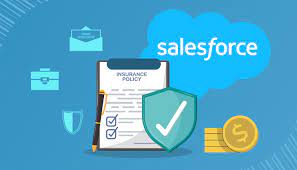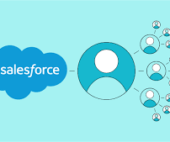Best Practices for Salesforce Implementation in Insurance Companies In the digital world of the insurance industry, technological innovation is a major key to staying competitive. As insurance companies face growiing customer expectations, regulatory requirements, and market shifts, the deployment of robust CRM solutions like Salesforce has become a strategic necessity. CRMs are foundational to building a customer-centric business. However, successful Salesforce implementation requires more than just installing software—it involves strategic planning, careful execution, and adherence to best practices. Customer relationship management (CRM) systems can face several challenges in the insurance industry, including: Salesforce Implementation in Insurance Generating a smooth transition to an Insurance CRM post-implementation is crucial to maxixing your investment and minimizing your disruptions. Here are key guidelines for effectively implementing Salesforce in insurance companies. Define Clear Objectives and Metrics Before starting a Salesforce implementation, it’s crucial for insurance companies to establish clear objectives that align with their business goals. Whether the aim is to improve customer engagement, streamline claims processing, or boost agent productivity, defining SMART (Specific, Measurable, Achievable, Relevant, Time-bound) goals is essential. Identifying key performance indicators (KPIs) to track progress ensures accountability and fosters continuous improvement throughout the process. Tailor Salesforce to Insurance Workflows CRM solutions must be customized to fit the unique workflows, processes, and terminology of the insurance industry. This could include configuring custom objects for policy management, automating underwriting workflows, or integrating with third-party systems for claims adjudication. Customizing Salesforce in this way not only enhances system usability but also ensures that it seamlessly integrates with existing operations, maximizing efficiency and user adoption. Empower Agents with Mobile Capabilities In the digital world, insurance agents often work remotely, meeting clients and closing deals outside the office. Providing agents with mobile capabilities via Salesforce’s mobile app allows them to access vital information, manage leads, and collaborate with colleagues anytime, anywhere. Real-time access to client data, policy details, and sales tools boosts agent productivity, responsiveness, and overall customer satisfaction. Integrate Data Sources for a 360-Degree Customer View A comprehensive view of customers is essential for delivering personalized experiences and anticipating their needs. Integrating various data sources—such as customer profiles, policy information, claims history, and interaction records—into Salesforce creates a unified view of each customer’s journey. Utilizing Salesforce’s integration features helps break down data silos, improve cross-functional collaboration, and provide actionable insights for better decision-making. Know Your Super Users and Mentors If not prior to then certainly during end-user traing you will notice quick learners and advocates for the software. Some people will have their light bulb ah-ha moments quicker than others. Most people will not have them until you directly speak to how the CRM is going to make their work life easier. Designating such an invidual as the department or team CRM champion brings a local, known point of contact for users while learning, provides infectious excitement for the solution and will continously provide user training and support. Prioritize Data Security and Compliance Given the sensitive nature of customer information, data security and compliance are critical for insurance companies. Salesforce offers extensive security features and compliance tools to protect sensitive data and adhere to regulations like GDPR and HIPAA. Implementing measures such as encryption, access controls, and audit trails within Salesforce ensures data confidentiality, integrity, and availability, which is vital for maintaining customer trust and meeting regulatory requirements. Show the Value Proposition Any time a new part of the martech stack is added there will be some fear and trepidation among staff. It is important to dispel their fears by getting buy-in from users and stakeholders alike. Some clients will conduct a sentiment analysis guaging what stakeholders feel about this technology change. Invest in User Training and Change Management The success of Salesforce implementation is as much about people as it is about technology. Comprehensive user training and change management are crucial for ensuring high adoption rates and maximizing ROI. Providing customized training sessions, user guides, and continuous support helps employees become proficient in using Salesforce. Additionally, gathering feedback, addressing concerns, and fostering a culture of continuous learning are important aspects of effective change management. Hopefully while gauging employee and stakeholder buy-in you also got a sense of the roadblocks and challenges your team fearfully anticipate. You should tailor all training and change management to the team’s expected usage as well as their concerns. Using the Right Training Delivery Companies may experience employee resistance while planning training and skill enhancing programs. Diversify the training delivery method to keep it interesting and educational for all users. The more learning styles you can speak to, the more effective your training will be. A mix of self-paced learning,. Salesforce Trailheads, in-person classes, webinars, videos and easy-to-use how-to guides ensure all your team hits the ground running with confidence and knowledge. What is the role of CRM in the insurance industry? CRM for insurance companies consolidates the databases and centralizes all information related to contacts, orders, transactions, previous interactions, policy details, claims requests, etc. This simplifies data management and helps eliminate data silos. CRM stands for Customer Relationship Management. A CRM solution for insurance agents is software that addresses needs specific to insurance agencies and brokers. Salesforce implementation offers significant benefits for insurance companies looking to modernize their operations, enhance customer experiences, and achieve growth. By following best practices—such as setting clear objectives, customizing Salesforce to fit specific workflows, empowering agents with mobile tools, integrating data for comprehensive customer views, prioritizing data security and compliance, and investing in training and change management—insurance companies can fully leverage Salesforce’s capabilities and excel in a competitive market. As a trusted Salesforce consulting partner, we are committed to supporting insurance companies in their digital transformation journeys. Contact Tectonic today to learn how we can assist in your Salesforce implementation efforts. What is the difference between insurance CRM and AMS? So what’s the insurance difference between CRM and agency management? The main difference between the two is that insurance CRM prioritizes relationships between client and agent, while insurance agency management systems help agents organize and







